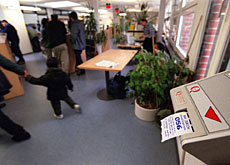Welfare handouts put authorities under strain

The number of people claiming welfare benefit in Switzerland grew by ten per cent last year to 300,000.
Local authorities across Switzerland warn they will not be able to cope if the trend continues.
Welfare benefits are the last safety net in Switzerland for people without work after they can no longer claim unemployment benefit.
In July the government slashed by a quarter the period during which benefit can be claimed – from 520 days to 400.
On Monday social aid institutions said the shortened period for unemployment benefit, as well as the economic downturn, were the main causes for the growing demand on welfare aid.
“One of the causes of this increase is the shortening of the period of unemployment benefit, which [we] were opposed to,” said Urs Geissmann, director of the Switzerland’s city authorities.
Growing problem
Social welfare groups warn that the cantonal and communal authorities could buckle under the strain of growing demand for welfare benefits, which are paid out from their coffers.
Some saw their welfare costs rise by 20 per cent over 2003.
Ueli Tecklenburg, a spokesman for the welfare groups, predicts that even if the economy improves in 2004, the number of claimants will not drop for two or three years.
“An economic upswing wouldn’t be a solution to this problem,” he told swissinfo. “Statistically, the number of people on social benefits increases during times of economic hardship, but all that happens in better times is that this number stabilises.”
One of the main reasons for this, he explained, was that people who had been out of work for a long time could not reap the benefits of an economic upswing because they were no longer able to find jobs suited to their skills.
The welfare groups believe that if no changes are made to the system, some 400,000 people, or six per cent of the population, will be claiming welfare benefit by 2007.
Incentives
Unable to rely on economic recovery to solve their problems, local authorities must adopt new measures to curb the increase in claimants, the institutions say.
“One solution might be that, instead of pumping more money into the system, we should find other measures, such as training programmes in collaboration with other benefit agencies, such as the unemployment office,” Tecklenburg said.
Other solutions may be to better coordinate benefit systems between the different cantonal offices, or to create more incentives for people to find employment.
Claimants
According to Walter Schmid, who heads Switzerland’s alliance of welfare groups, claimants are mostly elderly people, single-parent families, foreigners and those on the margins of society.
Tecklenburg believes that the high number of claims from foreigners living in Switzerland is an additional strain on the system.
“Foreigners are statistically over-represented compared to Swiss nationals,” he argued.
“That’s something we inherited from the 60s and 70s when our immigration policy allowed a lot of poorly educated people [to come to Switzerland].”
swissinfo with agencies
Welfare authorities’ estimates for the average cost of living for:
A family with two children and both parents unemployed at SFr4,367 ($3,540) per month;
An unemployed person living alone, at SFr2,056 per month;
A single parent bringing up one child at SFr 2,939 per month.
According to the Organisation for Economic Cooperation and Development (OECD), one person in two in Switzerland who needs social aid does not make a claim.
The shortening of the period during which unemployment benefit can be claimed and the economic downturn during 2003 were cited as the main causes of the increase in welfare claimants.
It suggested adopting new measures, such as training programmes at benefit offices, and more incentives for unemployed people to find jobs.
Most welfare claimants are elderly people, single parent families, foreigners and those on the margins of society.

In compliance with the JTI standards
More: SWI swissinfo.ch certified by the Journalism Trust Initiative



You can find an overview of ongoing debates with our journalists here. Please join us!
If you want to start a conversation about a topic raised in this article or want to report factual errors, email us at english@swissinfo.ch.